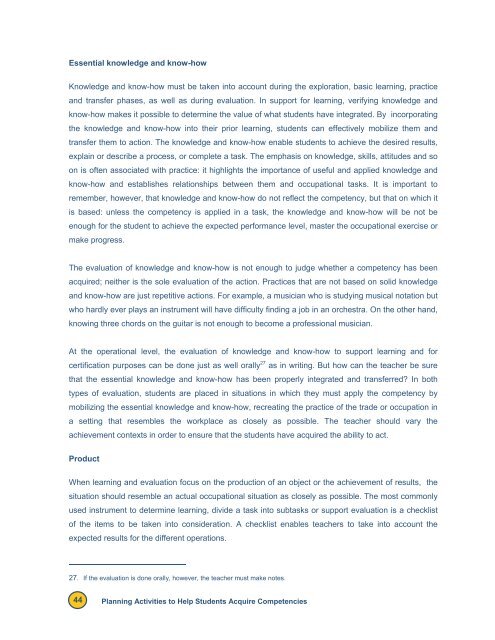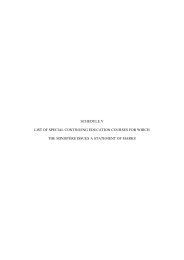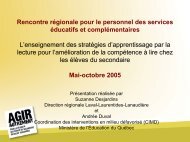Reference Framework for Planning Learning and Evaluation Activities
Reference Framework for Planning Learning and Evaluation Activities
Reference Framework for Planning Learning and Evaluation Activities
You also want an ePaper? Increase the reach of your titles
YUMPU automatically turns print PDFs into web optimized ePapers that Google loves.
Essential knowledge <strong>and</strong> know-how<br />
Knowledge <strong>and</strong> know-how must be taken into account during the exploration, basic learning, practice<br />
<strong>and</strong> transfer phases, as well as during evaluation. In support <strong>for</strong> learning, verifying knowledge <strong>and</strong><br />
know-how makes it possible to determine the value of what students have integrated. By incorporating<br />
the knowledge <strong>and</strong> know-how into their prior learning, students can effectively mobilize them <strong>and</strong><br />
transfer them to action. The knowledge <strong>and</strong> know-how enable students to achieve the desired results,<br />
explain or describe a process, or complete a task. The emphasis on knowledge, skills, attitudes <strong>and</strong> so<br />
on is often associated with practice: it highlights the importance of useful <strong>and</strong> applied knowledge <strong>and</strong><br />
know-how <strong>and</strong> establishes relationships between them <strong>and</strong> occupational tasks. It is important to<br />
remember, however, that knowledge <strong>and</strong> know-how do not reflect the competency, but that on which it<br />
is based: unless the competency is applied in a task, the knowledge <strong>and</strong> know-how will be not be<br />
enough <strong>for</strong> the student to achieve the expected per<strong>for</strong>mance level, master the occupational exercise or<br />
make progress.<br />
The evaluation of knowledge <strong>and</strong> know-how is not enough to judge whether a competency has been<br />
acquired; neither is the sole evaluation of the action. Practices that are not based on solid knowledge<br />
<strong>and</strong> know-how are just repetitive actions. For example, a musician who is studying musical notation but<br />
who hardly ever plays an instrument will have difficulty finding a job in an orchestra. On the other h<strong>and</strong>,<br />
knowing three chords on the guitar is not enough to become a professional musician.<br />
At the operational level, the evaluation of knowledge <strong>and</strong> know-how to support learning <strong>and</strong> <strong>for</strong><br />
certification purposes can be done just as well orally 27 as in writing. But how can the teacher be sure<br />
that the essential knowledge <strong>and</strong> know-how has been properly integrated <strong>and</strong> transferred In both<br />
types of evaluation, students are placed in situations in which they must apply the competency by<br />
mobilizing the essential knowledge <strong>and</strong> know-how, recreating the practice of the trade or occupation in<br />
a setting that resembles the workplace as closely as possible. The teacher should vary the<br />
achievement contexts in order to ensure that the students have acquired the ability to act.<br />
Product<br />
When learning <strong>and</strong> evaluation focus on the production of an object or the achievement of results, the<br />
situation should resemble an actual occupational situation as closely as possible. The most commonly<br />
used instrument to determine learning, divide a task into subtasks or support evaluation is a checklist<br />
of the items to be taken into consideration. A checklist enables teachers to take into account the<br />
expected results <strong>for</strong> the different operations.<br />
27. If the evaluation is done orally, however, the teacher must make notes.<br />
44 <strong>Planning</strong> <strong>Activities</strong> to Help Students Acquire Competencies




